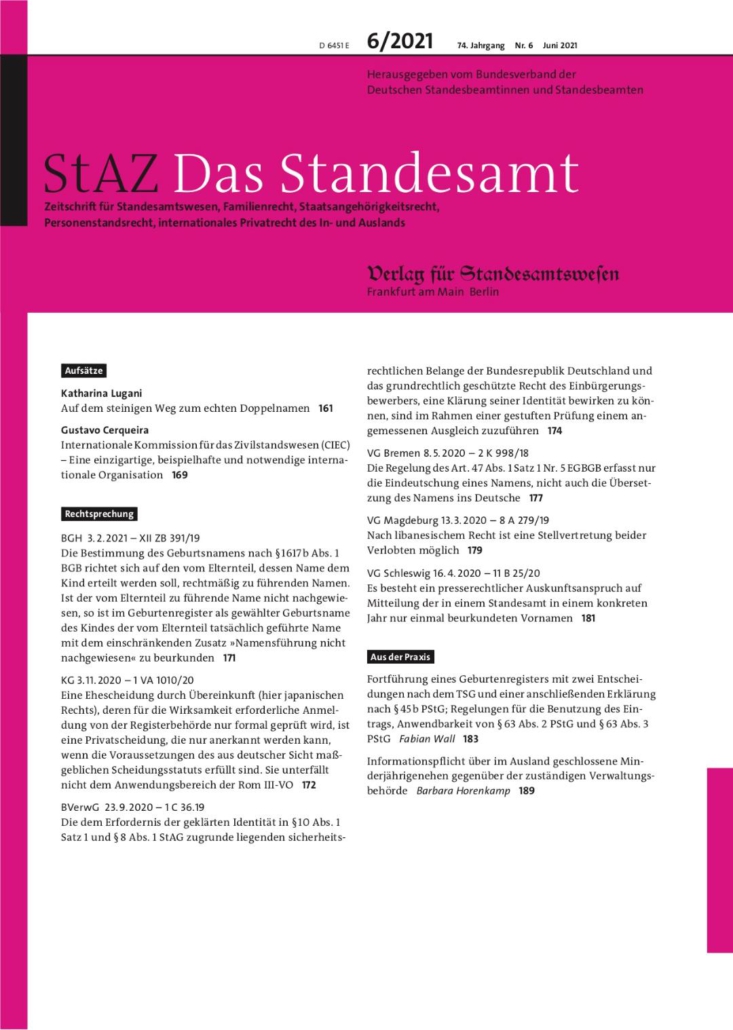

Comments by Ivana Isailovic & Alice Margaria
The case of Valdís Fjölnisdóttir and Others v. Iceland brings to the attention of the European Court of Human Rights (ECtHR) the no longer new, yet persistently complex, question of the determination of legal parenthood following international surrogacy arrangements. Similar to previous cases, such as Mennesson v France, Labassee v France, andParadiso and Campanelli v Italy, this complaint originated from the refusal of national authorities to recognise the parent-child relationship established in accordance with foreign law on the ground that surrogacy is prohibited under national law. Valdís Fjölnisdóttir and Others is the first case of this kind involving a married same-sex couple who subsequently divorced. Like the applicants in the case of Paradiso and Campanelli v Italy, Ms Valdís Glódís Fjölnisdóttir and Ms Eydís Rós Glódís Agnarsdóttir are not biologically linked to their child, who was born in California.
Ivana Isailovic & Alice Margaria’s comments answer three questions:
1) What’s new in this case?
2) What are the legal effects of this decision?
3) What are alternative legal framings and ideas?
1. Were you surprised by this ruling? Is there anything new in this case?
Alice: This judgment is emblematic of the ECtHR’s generally cautious and minimalistic approach to assessing the proportionality of non-recognition vis-à-vis unconventional parent-child relationships. It is widely agreed (e.g., Liddy 1998; Stalford 2002; Choudhry and Herring 2010) that the Court has over time expanded the boundaries of what constitutes ‘family life’ and supported the adoption of more inclusive and diverse conceptions of ‘family’ through its dynamic interpretation of Article 8 ECHR. Yet, as I have argued elsewhere, this conceptual expansion has not translated into the same protection of the right to respect for family life for all unconventional families. Valdís Fjölnisdóttir and Others is a further manifestation of this trend. The Court has indeed no difficulty in qualifying the bonds existing between the two women and their child as ‘family life’. As far as the applicability of the ‘family life’ limb of Article 8 is concerned, the quality and duration of the relationship at stake trump biological unrelatedness. Yet when it comes to assessing the proportionality of the interference of non-recognition with the applicants’ right to respect for family life, the Court is satisfied with the de facto preservation of the family ties existing between the applicants, and diminishes the disadvantages created by lack of recognition of their parent-child relationship – just as it did in Mennesson. Icelandic authorities had taken steps to ensure that the applicants could continue to enjoy their family ties in spite of non-recognition by placing the child in the foster care of the two women and making these arrangements permanent. This had – from the Court’s perspective – alleviated the distress and anguish experienced by the applicants. In addition, the child had been granted Icelandic citizenship by a direct act of Parliament, with the effect of making his stay and rights in the country regular and secure. As a result, according to the Court, non-recognition had caused the applicants only limited practical hindrances to the enjoyment of their family life. As in Mennesson, therefore, the Court finds that there is family life among the three applicants, but no positive obligation on the part of the State to recognise the parent-child relationships in accordance with the California birth certificate. Whilst it is true that, in the case at hand, the family ties between the applicants had indeed been afforded some legal protection through foster care arrangements (unlike in previous cases), it seems that the unconventional nature of the family at stake – be it due to the lack of a biological link, the fact that it involves two mothers, or because they resorted to surrogacy – continues to hold back the Court from requiring the State to recognise the existing ties ab initio and through filiation. This is also line with the Advisory opinionof 10 April 2019 (request no. P16-2018-001), where the Grand Chamber clarified that States have the obligation to provide ‘only’ some form of legal recognition – e.g., adoption – to the relationship between a child born from surrogacy and their non-genetic mother.
Whilst not setting a new jurisprudential trajectory on how to deal with the determination of legal parenthood following international surrogacy, Valdís Fjölnisdóttir and Others brings two novel elements to bear. The first is encapsulated in para 64, where the Court determines the Supreme Court’s interpretation of domestic provisions attributing legal motherhood to the woman who gives birth to be ‘neither arbitrary nor unreasonable’ and, accordingly, considers that the refusal to recognise the family ties between the applicants and the child has a ‘sufficient basis in law’. In this passage, the Court takes a clear stance on the rule mater semper certa est, which, as this case shows, has the potential to limit the recognition of contemporary familial diversity (not only in the context of surrogacy but also in cases of trans male pregnancies, see e.g. OH and GH v Germany, Applications no. 53568/18 and 54941/18, communicated on 6 February 2019). Second, and in contrast, Judge Lemmens’ concurring opinion takes one important step towards demystifying and problematising the relevance of biological relatedness in regulating legal parenthood following international surrogacy. He points out that the negative impact of non-recognition is equal for all children born from surrogacy abroad who find themselves in legal limbo, regardless of whether they are biologically connected to their parents or not. He further adds that, whilst adoption is an alternative means of recognition, it does not always provide a solution to all difficulties a child might be experiencing. In the case at hand, for instance, adoption would have benefited only one parent-child relationship: the couple had indeed divorced through the national proceedings and, therefore, a joint adoption was no longer a possibility for them. This concurring opinion therefore moves towards questioning and potentially revising the terms of the debate between, on the one hand, preventing illegal conduct by intended parents and, on the other hand, tolerating legal limbo to the detriment of children.
Ivana: On the one hand, there is nothing new in this decision. Like in Mennesson (2014) and Paradiso & Campanelli (2017), the Court continues to “constitutionalize” domestic PIL rules. As many PIL scholars argued, this reflects the transformations of conflict of laws rules and methods, as the result of human rights field’s influence. Following the ECHtR and the CJEU case law, conflicts of laws rules became subordinate to a proportionality test which implies weighing various interests at stake. In this case, it involves balancing applicants’ rights to private and family life, and the interests of the state in banning commercial surrogacy.
Second, like in its previous decisions on surrogacy, by recognizing the importance of the mater semper est principle, the ECtHR continues to make the biological link preeminent when defining the scope of human rights protection
On the other, it seems that there is a major rupture with previous decisions. In Mennesson (para 81 & 99), and the advisory opinion requested by the French Cour de cassation (2019) (para 37-38), the ECtHR emphasized child’s right to a recognition of their legal relationship with their intended parents (part of the child’s right to private and family life). This has in turn influenced the Court’s analysis of the scope of states’ margin of appreciation.
In the case however, the Court pays lip service to child’s interests in having their legal relationship with their intended parents recognized (besides pointing out that, under domestic law, adoption is open to one of the two women, par. 71, and that the State took steps to preserve the bond between the (intended) parents and their child).
Without the legal recognition of the parent-child relationship, however, the child—who is placed in foster care—is left in a vulnerable legal position that is hardly in line with the protection of children’s rights. It is unclear what explains this shift in the Court’s reasoning, and Judge Lemmens’ concurring opinion that tries to make sense of it is unconvincing.
2. What are the effects of this decision in terms of the regulation of global surrogacy?
Ivana: There are at least two legal consequences for PIL. First, the decision legitimizes a flawed, biological and marginalizing understanding of legal parenthood/motherhood. Second, it legitimizes feminists’ anti-surrogacy arguments that dovetail with conservative anti-LGBTQ transnational movements’ positions.
According to the Court, mater semper certa est—the notion that the woman who gives birth to the child is the legal mother of that child— which justifies Iceland’s refusal to recognize the foreign parent-child link, is neither “arbitrary nor manifestly unreasonable” (para 69)
But mater semper certa est has consistently been a bit more than an incantation.
In France, scholars showed that the Civil Code from 1804 originally allowed and promoted the constitution of families which didn’t reflect biological bonds, as it was enough to prove marriage to infer kinship. In addition, the mater semper certa est principle has been continuously eroded by assisted reproductive technology, which today enables multiple individuals to be genetic parents.
Motherhood has always been stratified, and mater semper est has operated differently in relation to class, race and gender. Research shows how in the US during slavery, African American women were not considered to be the legal mothers of children they gave birth to, and how today, the state monitors and polices the lives of women of color and poor women (see for instance the work by Angela Davis and Dorothy Roberts). On this side of the Atlantic, between 1962-1984, the French state forcefully deported thousands of children from poor families from Réunion (a former French colony now an oversees territory) to metropolitan France. Finally, this principle penalizes those who do not identify with gender binaries, or with female identity, while being able to give birth, or those who identify as women/mothers, but are unable/unwilling to give birth.
Second, the decision in some respects illustrates the mainstreaming within law of feminists’ anti-surrogacy arguments, which overlap with ant- feminist, conservative, anti-LGBTQ movements’ discourses. Iceland’ s argument that surrogacy is exploitative of surrogates, mirrors affluent anti-surrogacy networks’ positions that anti-surrogacy feminist groups adopted in the 1980s. These lobbies argue that surrogacy constitutes the exploitation of women, and that surrogacy severs the “natural maternal bonding” and the biological link between the mother and the child.
This understanding of surrogacy promoted by feminists came to overlap with the one adopted by transnational conservative, pro-life, anti-feminist, anti-LGBTQ groups, and it is interesting that some of the arguments adopted by the Court correspond to those submitted by the conservative institute Ordo Iuris, which intervened in the case. Another example of this overlap, is the EU lobby group No Maternity Trafficking, which includes right-wing groups, such as La Manif pour tous, that organized protests against the same-sex marriage reform in France in 2013.
Here is how the emphasis on the biological link in relation to the definition of legal parenthood may overlap with anti-LGBTQ discourses. As I argued elsewhere, in France, private lawyers, feminists, psychoanalysts, and conservative groups such as La Manif pour tous defended the biological understanding of legal filiation, to oppose the same-sex marriage reform which also opened adoption to same-sex couples, because, according to them, biological rules sustain a “symbolic order” which reflects the “natural order” and outside that order a child will become “psychotic.” This understanding of legal filiation is however relatively recent in France and is in contradiction with the civil law approach to filiation based on individual will. In fact, different actors articulated these arguments in the 1990s, when queer families started demanding that their families be legally protected and recognized.
Alice: This decision confirms the wide, yet not unlimited, freedom States enjoy in regulating surrogacy and the legal consequences of international surrogacy in their territories and legal systems. In so doing, it legitimises the preservation and continuing operation of traditional filiation rules, in particular the mater semper certa est rule, which anchors legal motherhood to the biological processes of pregnancy and birth. It follows that the public order exception can still be raised. At the same time, however, authorities are required to ensure that some form of recognition be granted to de factoparent-child relationships created following international surrogacy through alternative legal routes, such as foster care or adoption. In a nutshell, therefore, the regulatory approach to international surrogacy supported by this decision is one of accommodation, as opposed to recognition, of familial diversity. Parental ties created following surrogacy arrangements abroad have to be granted some form of legal recognition, to be given some standing in the national legal order, but do not necessarily have to be recognised in their original version, i.e., as legal parental ties ab initio.
3. If not this legal framing, which one should we (scholars, courts or activists) adopt to think about transnational surrogacy?
Alice: Conflicts of laws in this context can result in two opposing outcomes: openness to familial and other types of diversity, but also – as this case shows – attachment to conventional understandings of parenthood, motherhood and ways of creating and being a family. If we imagine a continuum with the abovementioned points as its extremes, the Court seems to take an intermediary position: that of accommodating diversity. The adoption of such an intermediary position in Valdís Fjölnisdóttir and Others was facilitated by the existence of foster care arrangements and the uninterrupted care provided by the first and second applicants to their child since his birth. In the Court’s eyes, therefore, the child in this case was not left in ‘complete’ legal limbo to the same extent as the children in Mennesson, nor put up for adoption as in the case of Paradiso and Campanelli.
To address the question ‘which framing shall we adopt?’, the answer very much depends on who ‘we’ is. If ‘we’ is the ECtHR, then the margin for manoeuvring is clearly more circumscribed than for activists and scholars. The Court is bound to apply some doctrines of interpretation, in primis the margin of appreciation, through which it gains legitimacy as a regional human rights court. The application of these doctrines entails some degree of ‘physiological’ discretion on the part of the Court. Determining the width of the margin of appreciation is never a mechanical or mathematical operation, but often involves drawing a balance between a variety of influencing factors that might concur simultaneously within the same case and point to diametrically opposed directions. Engaging in this balancing exercise may create room for specific moral views on the issue at stake – i.e., motherhood/parenthood – to penetrate and influence the reasoning. This is of course potentially problematic given the ‘expressive powers’ of the Court, and the role of standard setting that it is expected to play. That being said, if regard is given to the specific decision in Valdís Fjölnisdóttir and Others, despite the fact that the outcome is not diversity-friendly, the reasoning developed by the Court finds some solid ground not only in its previous case law on surrogacy, but more generally in the doctrinal architecture that defines the Court’s role. So, whilst scholars advocating for legal recognition of contemporary familial diversity – including myself – might find this decision disappointing in many respects (e.g., its conventional understandings of motherhood and lack of a child-centred perspective), if we put Valdís Fjölnisdóttir and Others into (the Strasbourg) context, it would be quite unrealistic to expect a different approach from the ECtHR. What can certainly be hoped for is an effort to frame the reasoning in a manner which expresses greater sensitivity, especially towards the emotional and psychological consequences suffered by the applicants as a result of non-recognition, and thus gives more space to their voices and perceptions regarding what is helpful and sufficient ‘to substantially alleviate the uncertainty and anguish’ they experienced (para 71).
Ivana: In some respects, this decision mirrors dominant PIL arguments about surrogacy. For some PIL scholars, surrogacy challenges traditional (“natural”) mother-child bond, when historically legal motherhood has always been a stratified concept. Other PIL scholars argue that surrogacy raises issues of (over)exploitation of surrogates and that women are coerced into surrogacy, but never really explain what these terms mean under patriarchy, and in a neoliberal context.
Like many economic practices in a neoliberal context, transnational surrogacy leads to abuses, which are well documented by scholars. But, understanding what law can, cannot or should do about it, requires, questioning the dominant descriptions of and normative assumptions about surrogacy that inform PIL discourses.
Instead of the focus on coercion, or on a narrow understanding of what womanhood is, like the one adopted by relational feminism, I find queer and Marxist-feminists’ interventions empirically more accurate, and normatively more appealing.
These scholars problematize the distinctions between nature/ technology, and economy/ love which shape most of legal scholars’ understanding of surrogacy (and gestation). As Sophie Lewis shows in her book Full Surrogacy Nowprocreation was never “natural” and has always been “technologically” assisted (by doctors, doulas, nurses, nannies..) and gestation is work. Seeing gestation as work seeks to upend the capitalist mode of production which relies on the unpaid work around social reproduction. Overall, these scholars challenge the narrow genetic understanding of kinship, argue for a more capacious definition of care, while also making space for the recognition of surrogates’ reproductive work, their voices and their needs.
Legally recognizing the reproductive labor done by surrogates, may lead to rethinking how we (scholars, teachers, students, judges, activists…) understand the public policy exception/ recognition in PIL, and the recent proposals to establish binding transnational principles, and transnational monitoring systems for regulating transnational surrogacy in the neoliberal exploitative economy.
Ivana Isailovic is Assistant Professor of Law at the University of Amsterdam and is a member of the Sustainable Global Economic Law project. She is the co-leader (with Ralf Michaels) of the Gender & Private International Law project. Her research and teaching sit at the intersection of law, gender and political economy in transnational contexts.
Alice Margaria is a Senior Research Fellow in the Law & Anthropology Department at the Max Planck Institute for Social Anthropology. Her current research focuses on fatherhood, cultural/religious diversity and human rights. She teaches ‘Gender and Diversity in the International Context’ at Freie Universität (Berlin).








